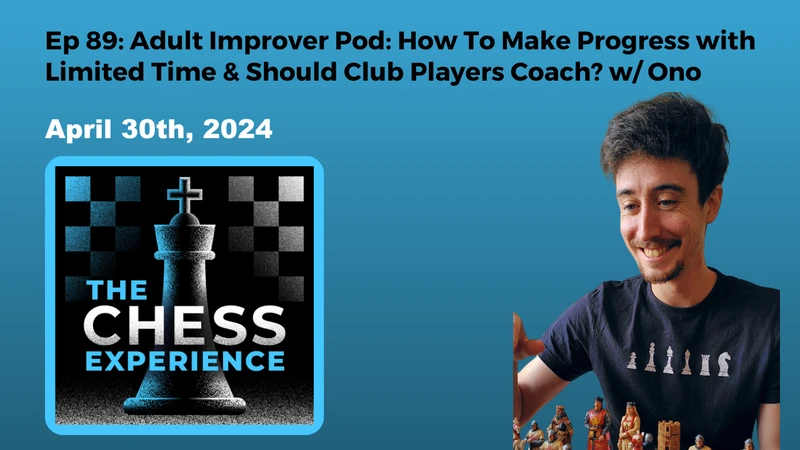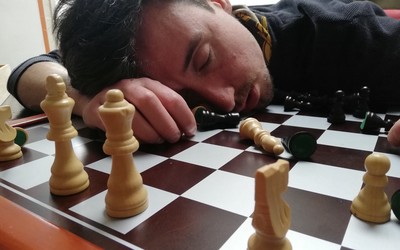
Adult Chess Clock
I used to say that nobody doesn’t have the time for something, they just don’t want to prioritise it.Once I had a kid I had to admit that wasn’t true.
Some days I don't have time to study chess.
There have even been whole periods of weeks and even months where I haven’t had time for consistent practice. But in those times I did manage to squeeze in a bit.
In this post I share some practical advice for the busy adult - whether you have kids or not - on how to find time to study chess.
Adult Improver Chess Coaching | Book your Free Trial Lesson | Join the Adult Improver Hangouts
The Chess Experience
Last week I was interviewed by Daniel Lona on his podcast The Chess Experience.
In part of the interview we discussed finding time for chess study as a busy adult. I wanted to write this blog post to clarify my ideas and flesh them out a bit more.
But let’s start with the question of whether or not you do have time.

Do you watch Netflix? Do you spend time with your significant other? Do you do sports? Do you scroll through your Twitter feed? Whilst I’m not suggesting any of these activities should be replaced by chess (we all need downtime) the point is we often can choose to study chess but do something else instead.
We read a book, watch a series, play a game, go for a run, go to the pub or whatever it is you do to switch off.
I think part of making time for chess comes down to motivation. So before we get into practical ways to fit chess into a busy life I want to start by talking about how to motivate yourself to fit chess into a busy life.
North Star Motivation
The first motivational tool should be your north star, your long term goal.
A lot of people think rating goals can be unhealthy and I agree if they are time specific - if I was to say I want to hit an internal rating of 1700 at my club by the end of the year that might be a realistic goal for me, but I don’t think it would help me at all. In fact it might do the opposite. It would pile on a lot of unnecessary pressure and probably cause me a lot of stress and suffering as the deadline loomed. And I don’t think it would make me any more or less likely to turn up to do my daily chess study.
Instead, having a non-time specific ‘one day’ ambition can help you to remember why you're studying this board game so intensely, particularly if you're in your office hearing the white noise of a netflix standup comedy special coming from the next room. You're trying to focus, but the sounds are so tempting - bursts of your significant others laughter and the occasional sound of a wine glass being refilled.
But you stay in the room and try to find out why you played Rb5 because one day...
...You are going to become a chess master. You are going to hit that magical round number on your favorite chess website. You are going to become club champion. You are going to win your section at your favorite tournament. You are going to defeat Bill who always flaunts around the chess club with his stupid 2000 rating and his stupid face. You are going to defeat him, then take his mum out for a nice steak dinner and never call her again. Hey Bill, how does Nf6# taste? Eat it up Bill.*
Right where were we? Yeah. It can be hard to pick chess over more relaxing activities. So having a good reason to sit down everyday can help when it comes to getting your arse into the chair and doing the work.
*Disclaimer: Bill is not based on a real person from my chess club called Steve. Bill is a fictional character made up by the author.
Daily Motivation
For me, part of getting myself motivated to do the work comes from my long term goal, which in the podcast I said was to ‘one day’ win my clubs championship and have my name carved into the trophy. Great. But I take a lot from process goals too.
Building momentum helps me to keep going day in, day out.
I am the master of sitting down and writing a study plan: I’m going to do 3 puzzles a day. 15 minutes of pattern recognition, play and take a lesson from 1 blitz game. I’m going to annotate and analyse my weekly game. I start off flying. As each day goes by my confidence builds with my own sense of self esteem. Look how committed and disciplined I am, I say.
And then I have a bad day.
I don’t get to an element of my study. Life happens. Something comes up and I miss a single day. And then for some reason my stupid brain decides because I have missed one day I may as well skip another. A single missed day becomes another, that turns into a week and finally my study digresses into random directionless meandering whenever I feel like it, instead of useful training.
One tool I have found recently to get over this flaw I seem to have is to layer in a bit of flexibility to my daily habits. Instead of aiming for 365 perfect checks in my study plan boxeseach year. I now aim for 90% in a given month. This more compassionate training program allows me to miss a single day and not feel like my streak is over or my plan is ruined.
Needle Movers
Needle movers is a term I learned from my wife who does businessy stuff for her job and TheOnoZone.
She’s told me it relates to the 80/20 rule, which I googled. It basically says that what you do with 20% of your time makes 80% of the difference, so you should work out what those activities are and prioritise them.
A large part of what I do for my students, particularly my students who are new to chess, is help them to cut through the crap and get started right away doing the things that really make a difference. I spent a lot of my first year in chess working out what worked and I wish I had someone who could have sped up that process for me.
So without getting into too much detail, I believe you should prioritse skill based work. For me that is doing 3 essential tasks.
The first is really really simple puzzles over and over again to work on your tactical pattern recognition and board vision. These should be largely single move chess puzzles.
The second is calculation. You can get this from playing longer games or/and you can try to do puzzles that require deeper calculation.
If you're new to chess it can be hard to find long chess puzzles that you can actually solve. For you I recommend two types of puzzle: pawn endgame puzzles (for which you might need to spend a little bit of time learning some basic pawn endgame theory) and mate in 2 or mate in 3 puzzles. Pawn endgame puzzles are often long but simple. In a pawn race for example you might have to move two pawns mentally across the whole board. It will really stretch your visualization. The same with mate puzzles. You know what you are aiming for and so you can actually start calculating.
I found at the beginning of my chess journey that harder puzzles with lots of pieces on the board often wasted my time. I wasn’t calculating - I was searching. I was looking at random moves because I didn’t spot the key idea. Spending 15 minutes on a puzzle isn’t helping train your calculation muslces if you're not actually moving pieces around but are just staring at the position feeling lost.
The third needle mover is analysing your thought process during long games. That means writing down what you were feeling and thinking before each move to identify flaws in our decision making process, psychological missteps, and to better understand ourselves and our own thought process.
Everything else is bonus work. Watching YouTube videos, reading chess books. Any exercise in which you gather chess knowledge is of course essential if you want to get better at chess, but if you only have 15 minutes, it’s not one of the needle movers in my opinion.
Chunking
I wrote about this before. Chunking. Such a satisfying word to say. Chunk. Just brilliant.
By dividing your study plan into bite size chunks. You can fit it into a busy schedule. Not everyone has an uninterrupted hour everyday to study chess. But everyone has moments.
Don’t go to the bathroom, take a chunk.
Squeeze in ten minutes of chess whilst you squeeze out.
Become a chunker. Chunk whenever you can. And remember that chunking is the only way to do chess every day.
Sometimes I worry about the state of my mental health when I write these blogs.
Conclusion
So that’s it folks. My thoughts and tips for finding time to study chess as a busy adult.
Motivate yourself by finding your north star. Turn up everyday by building daily habits that you can break without breaking your motivation. Focus on the tasks that matter the most when it comes to improving your chess skills.
And chunk. Go on. Say out loud. Say, I am a chunker. Say it with conviction. Put on House of Pain’s Jump Chunk Around. Put on Cali Swag District’s Teach Me How To Dougie Chunky. That’s it. You're feeling it now. Welcome to chunk town.
Please check out the podcast episode I did with my friend Daniel.
If you like this blog, I’d really appreciate you throwing a few pennies my way by becoming a patreon supporter. Patreon Supporters get early access to my blog posts and aren’t constantly reminded to book a free trial lesson with me throughout the post. You’ll also be joining a really cool community of Adult Chess Improvers who meet up on zoom to talk about their chess.
If you want to learn more about chess improvment from me you can book a free trial lesson to see if we are a good fit.





